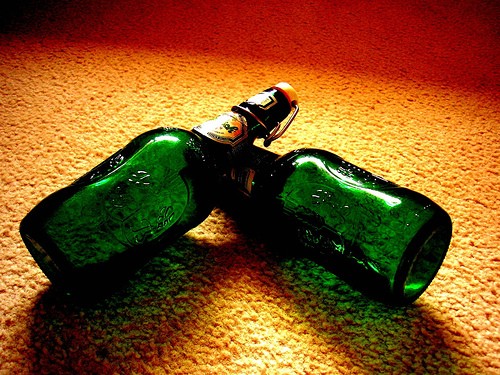Heavy Drinking Increases the Risks of 6 Types of Cancers, by as Much as 700%
Canadian researchers prove that heavy drinking increases your risk of liver and esophageal cancer by 700% and substantially increases your risks of stomach, colon, prostate and lung cancer.
Canadian cancer researchers at McGill University and the Universite de Montreal have linked heavy drinking to a dramatic increase in the risks for 6 different types of cancers.
The researchers, led by Dr. Andrea Benedetti of McGill, examined archived data collected on 3571 men, aged 35 to 70, during an occupational cancer study in the 1980s. The men were asked, at that time, about alcohol, diet and smoking habits, as well as occupation related questions.
Of the men, 14% were abstainers, 50% drank weekly and 36% drank daily. The researchers defined heavy drinkers as a person that has 180 drink years or greater and they compared cancer incidence rates amongst heavy drinkers to a reference sample of non drinkers. Drink years were calculated by averaging how many drinks were consumed per day, multiplied by the number of years of consumption. For example a person who drank 18 drinks per day for 10 years, would have reached 180 drink years. A person that drank 5 drinks a day for 40 years would have reached 200 drink years.
Benedetti found that heavy drinking increased the incidence rates of esophagus and liver cancer by 700%. Colon, prostate and stomach cancers increased by 80% and lung cancers appeared 50% more frequently. Moderate drinkers (not daily drinkers) did not seem at an increased cancer risk.
Although many previous studies have shown a link between heavy drinking and various types of cancer, the Canadian study is important, as it provides a glimpse across a wide range of cancers in real world circumstances. Jack Siematycki, cancer research chair at the Universite de Montreal and co-author of the study summarized, saying, “This study crystallizes many strands of evidence from different studies on different types of cancer and alcohol consumption.”
Beer and liquor drinkers seemed at greater of cancer risk than wine drinkers. The study authors say that while this is an interesting distinction, their study numbers aren’t substantial enough to draw evidence based conclusions on the risks of wine; said Benedetti, “The wine part is tantalizing but a bit exploratory.”
Although the research adds to a growing body of knowledge that proves how harmful chronic heavy drinking can be, Dr. Siematycki doesn’t recommend that people currently drinking at a moderate level make lifestyle changes based on these research results. He says that moderate drinking is also associated with some health benefits and that as long as drinking stays moderate, cancer risks are slight, saying, “anything below seven drinks a week is fine in terms of cancer risk. Above that, you get tradeoffs.”
Because the study data is based on only male study subjects, no information was available for cancers such as breast or ovarian cancer.
The research study results are published in Cancer Detection and Prevention Journal


